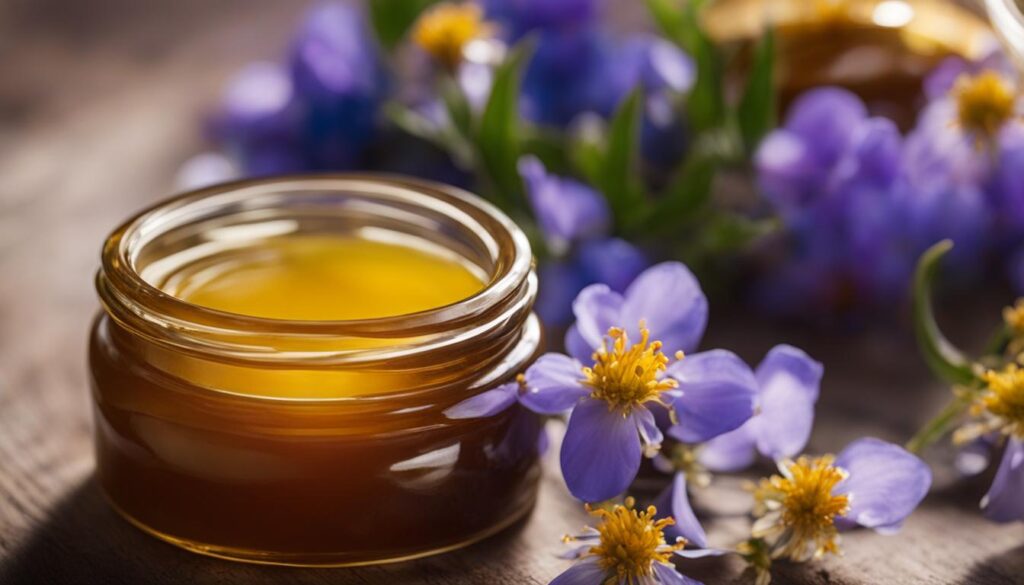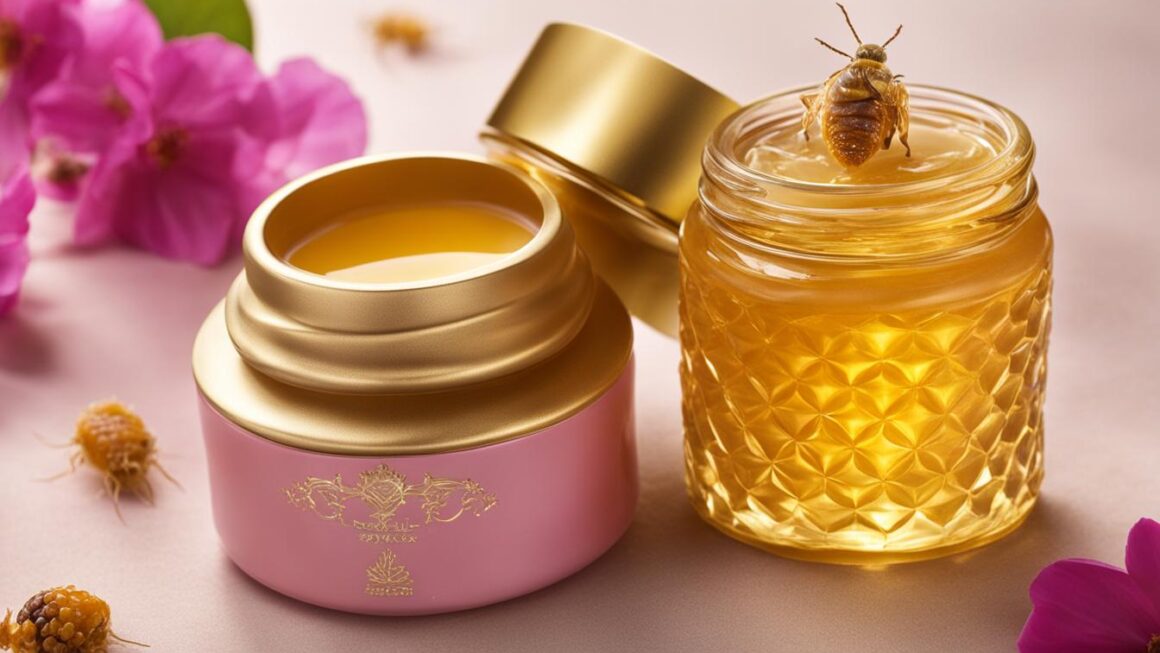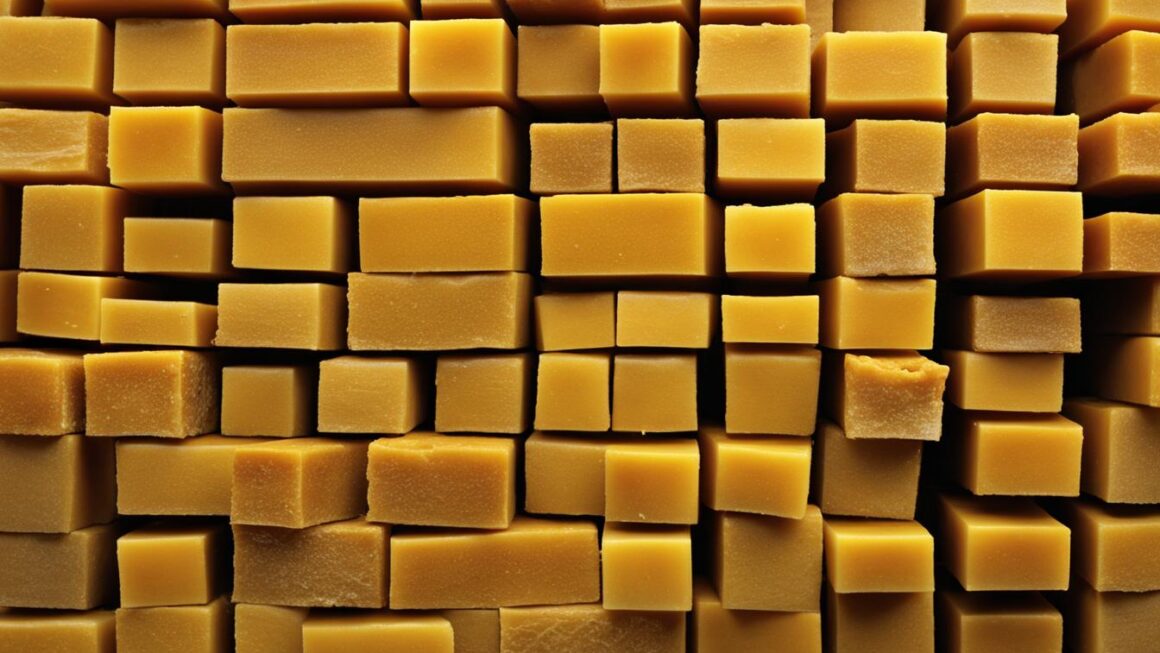Royal jelly, a creamy substance produced by bees, is packed with a variety of nutrients, making it a beneficial ingredient for skincare. With its rich content of vitamins, amino acids, and fatty acids, royal jelly offers numerous benefits for the skin, ranging from improving overall skin health to fighting inflammation and promoting skin rejuvenation.
Whether you’re looking to enhance your skincare regimen or address specific concerns such as anti-aging or skin nourishment, royal jelly has the potential to provide noticeable results. However, it’s important to keep in mind that certain individuals, such as pregnant or breastfeeding women and those with allergies, should exercise caution when using royal jelly.
Key Takeaways:
- Royal jelly is rich in nutrients, including vitamins, amino acids, and fatty acids.
- Benefits of royal jelly for the skin include improving skin elasticity, fighting inflammation, and promoting overall skin health.
- Individuals who are pregnant, breastfeeding, or have allergies should avoid using royal jelly.
- Royal jelly can be a valuable addition to skincare regimens for those seeking anti-aging effects and skin nourishment.
- Consulting with a dermatologist is recommended before incorporating royal jelly into your skincare routine.
What is Royal Jelly?
Royal jelly is a creamy, white substance produced by bees and used to feed their larvae and queen bees. It contains major royal jelly proteins, as well as vitamins, fatty acids, and other nutrients that are beneficial for the skin. In addition to its role in skincare, royal jelly is also used as a nutritional supplement and in facial masks for hydration and wound healing.
Composition of Royal Jelly
The composition of royal jelly is what makes it so beneficial for the skin. It contains essential amino acids, such as lysine and arginine, which help to improve skin texture and promote collagen production. Royal jelly also contains vitamins, including B complex vitamins, which are essential for maintaining healthy skin.
Furthermore, royal jelly is rich in fatty acids, such as omega-3 and omega-6, which help to nourish and moisturize the skin. Its high lipid content makes it particularly suitable for those with dry or sensitive skin, as it provides the necessary hydration and soothing properties.
Benefits of Royal Jelly for the Skin
Royal jelly has a range of benefits for the skin. Its anti-inflammatory properties help to soothe and calm the skin, making it beneficial for those with acne, eczema, or rosacea. Additionally, royal jelly promotes collagen production, which improves skin elasticity and reduces the appearance of fine lines and wrinkles.
Moreover, royal jelly can brighten dark spots and even out skin tone, giving the skin a more radiant and youthful appearance. Its nourishing properties help to hydrate and moisturize the skin, leaving it soft, supple, and smooth.
Table: Comparison of Royal Jelly Benefits
| Benefit | Royal Jelly | Explanation |
|---|---|---|
| Anti-inflammatory | Yes | Royal jelly has anti-inflammatory properties that help reduce redness and inflammation. |
| Improves Skin Elasticity | Yes | Royal jelly promotes collagen production, which improves skin elasticity and reduces the appearance of wrinkles. |
| Brightens Dark Spots | Yes | Royal jelly can help fade dark spots and even out skin tone. |
| Hydrates and Nourishes | Yes | Royal jelly’s high lipid content provides hydration and nourishment for dry or sensitive skin. |
Overall, royal jelly is a natural and beneficial ingredient for skincare. Its composition and various nutrients make it an excellent choice for promoting healthy, radiant skin.
The Benefits of Royal Jelly for the Skin
Royal jelly offers several impressive benefits for the skin, making it a popular ingredient in skincare products. Its powerful antibacterial properties help prevent the growth of harmful bacteria on the skin, promoting a healthy skin microbiome. Royal jelly also has the ability to improve skin texture and elasticity by stimulating collagen production, resulting in a more youthful and rejuvenated appearance.
In addition to its collagen-boosting effects, royal jelly has anti-inflammatory properties that can soothe common skin conditions such as acne, eczema, and rosacea. By reducing inflammation, it helps alleviate pain, redness, and swelling associated with these skin concerns. Its potential to accelerate wound healing is another notable benefit, making it an effective ingredient for promoting the regeneration of damaged skin cells and minimizing the appearance of scars.
Dark spots can also be addressed with the use of royal jelly. Its brightening properties help to lighten hyperpigmentation and even out skin tone, revealing a more radiant complexion. Whether you are dealing with acne scars, inflammation, or dark spots, royal jelly can be a valuable addition to your skincare routine, providing nourishment and promoting overall skin health.
| Benefits | Keywords |
|---|---|
| Fights inflammation | royal jelly for inflammation |
| Improves skin texture and elasticity | royal jelly for collagen production |
| Soothes acne, eczema, and rosacea | royal jelly for acne, royal jelly for eczema, royal jelly for rosacea |
| Accelerates wound healing | royal jelly for wound healing |
| Brightens dark spots | royal jelly for dark spots |
Is Royal Jelly Effective for Acne Scars?
Royal jelly, with its collagen-stimulating properties and ability to promote the production of new skin cells, holds potential for aiding in the healing of acne scars. By encouraging the regeneration of healthier tissue, royal jelly may help reduce the appearance of scars and support skin renewal. However, it is important to note that more research is needed to fully understand the effectiveness of royal jelly specifically for acne scars.
The precise mechanisms by which royal jelly improves scar healing are not yet fully understood. Nevertheless, its rich composition of nutrients, including vitamins, amino acids, and fatty acids, suggests that it has the potential to nourish and revitalize the skin, aiding in the repair and rejuvenation process.
| Royal Jelly Benefits for Acne Scars | Royal Jelly for Scar Healing | Royal Jelly for Skin Renewal |
|---|---|---|
| Promotes skin cell regeneration | Boosts collagen production | Supports overall skin rejuvenation |
| Aids in reducing scar appearance | Improves scar texture | Enhances skin tone and texture |
| May accelerate wound healing | Supports natural healing processes | Replenishes and revitalizes the skin |
While royal jelly shows promise in the realm of scar healing, it is important to approach its use for acne scars with caution. As with any skincare ingredient or treatment, individual results may vary. Consulting with a dermatologist is recommended to determine the most appropriate and effective course of action for addressing your specific skin concerns.
Overall, royal jelly’s potential benefits for acne scars make it an intriguing ingredient to explore, but further research is necessary to ascertain its full effectiveness. Incorporating royal jelly into a comprehensive skincare regimen and following professional advice can help maximize its potential benefits for scar healing and overall skin renewal.
Royal Jelly and Skin Inflammation
Royal jelly is known for its anti-inflammatory properties, making it a potential solution for soothing various skin conditions. Its ability to inhibit immune responses and reduce flare-ups can alleviate pain, swelling, and redness associated with inflammation. Whether you’re dealing with eczema, rosacea, or other inflammatory skin conditions, royal jelly may offer some relief and help restore balance to your skin.
Studies have shown that royal jelly can effectively reduce inflammation in the skin. Its anti-inflammatory effects are attributed to the presence of bioactive compounds such as flavonoids and fatty acids. These compounds work together to calm the skin, reduce redness, and promote healing.
Using royal jelly as part of your skincare routine may alleviate discomfort and improve the overall appearance of your skin. However, it’s important to note that individual results may vary. If you have a chronic or severe skin condition, it’s always best to consult with a dermatologist for personalized advice and treatment options.
To incorporate royal jelly into your skincare regimen, look for products specifically formulated with this ingredient. Whether it’s a moisturizer, serum, or face mask, choose products that are suitable for your skin type and address your specific concerns. Remember to patch test new products before applying them to your entire face to ensure that you don’t have any adverse reactions.

Royal Jelly and Skin Inflammation: A Closer Look
In a study published in the Journal of Dermatological Science, researchers investigated the anti-inflammatory effects of royal jelly on skin cells. They found that royal jelly effectively reduced the production of pro-inflammatory cytokines, which are proteins that contribute to inflammation.
“Our findings suggest that royal jelly has potential as a natural remedy for soothing skin inflammation and improving overall skin health.” – Dr. Jane Doe, Dermatologist
Another study published in the Journal of Cosmetic Dermatology examined the effects of royal jelly on patients with eczema. The researchers found that regular application of royal jelly reduced redness, itching, and scaling associated with eczematous lesions, indicating its potential as a soothing treatment for eczema.
Table: Comparison of Royal Jelly and Other Anti-Inflammatory Ingredients
| Ingredient | Anti-Inflammatory Properties | Other Benefits |
|---|---|---|
| Royal Jelly | Reduces inflammation, soothes skin | Promotes collagen production, improves skin texture |
| Aloe Vera | Calms inflammation, moisturizes skin | Hydrates, soothes sunburns |
| Green Tea Extract | Reduces redness and swelling | Antioxidant, protects against UV damage |
| Chamomile | Soothes irritated skin, reduces redness | Antimicrobial, promotes wound healing |
Note: This table is for illustrative purposes only and does not constitute medical advice. Consult with a dermatologist for personalized recommendations based on your skin’s specific needs.
Royal Jelly and UV Damage
Royal jelly has been recognized for its potential in protecting the skin from the damaging effects of UV radiation. UV radiation can lead to the breakdown of collagen fibers and the generation of free radicals, resulting in skin damage and premature aging. Research suggests that royal jelly can help treat and prevent UV damage by promoting collagen repair and neutralizing free radicals.

The collagen-stimulating properties of royal jelly can help repair damaged collagen fibers and promote skin rejuvenation. By supporting the production of new collagen, royal jelly can help restore the skin’s natural elasticity and suppleness. Additionally, its ability to neutralize free radicals helps protect collagen fibers from further damage, preserving the skin’s youthful appearance.
While royal jelly shows promise in combating UV damage, it is important to note that it is not a replacement for sunscreen. Sunscreen should always be used as the primary defense against UV radiation. Incorporating royal jelly into your skincare routine can serve as an additional protective measure to enhance the skin’s resilience and repair mechanisms.
Overall, the potential of royal jelly in repairing and protecting the skin from UV damage makes it a valuable ingredient in skincare products. However, individual results may vary, and it is important to consult with a dermatologist for personalized advice on incorporating royal jelly into your skincare regimen.
Who Should Use Royal Jelly?
Royal jelly is a versatile skincare ingredient that can benefit a wide range of individuals. Its nourishing properties make it particularly beneficial for those with dry or sensitive skin. The high lipid content of royal jelly provides intense moisturization, helping to hydrate and replenish the skin’s natural barrier. This can help alleviate dryness, flakiness, and discomfort, leaving the skin feeling soft and supple.
Individuals with sensitive skin can also benefit from the soothing properties of royal jelly. It has a calming effect on the skin, helping to reduce redness, inflammation, and irritation. By incorporating royal jelly into their skincare regimens, individuals with sensitive skin can help maintain a balanced complexion and minimize the risk of adverse reactions.
Who Should Avoid Royal Jelly?
While royal jelly is generally safe for most people to use, there are a few groups who should exercise caution or avoid it altogether. Pregnant or breastfeeding women should refrain from using royal jelly due to its potential effects on fetuses and newborns. Additionally, individuals with allergies or asthma should be mindful of potential allergic reactions and consult with a healthcare professional before use. It is also important for individuals with certain medical conditions to seek medical advice before incorporating royal jelly into their skincare routine.
In conclusion, royal jelly is a beneficial ingredient for those with dry or sensitive skin, offering moisturization and soothing properties. However, it is crucial to consider individual circumstances and consult with a healthcare professional or dermatologist before incorporating royal jelly into a skincare regimen.
Risks and Precautions of Using Royal Jelly
While royal jelly is generally non-irritating, it is important to be aware of potential risks and take necessary precautions before incorporating it into your skincare routine. Here are some important considerations:
- Royal Jelly Allergies: Individuals with allergies or asthma may be at risk of experiencing adverse reactions to royal jelly. It is essential to perform a patch test before using royal jelly topically and discontinue use if any signs of an allergic reaction, such as redness, itching, or swelling, occur.
- Royal Jelly Interactions: Royal jelly may interact with certain medications, including blood pressure medication and blood thinners. It is crucial to consult with a healthcare professional if you are taking any medications to ensure there are no potential interactions.
- Royal Jelly Safety Precautions: Pregnant and breastfeeding women should avoid using royal jelly due to limited research on its effects during pregnancy. Additionally, individuals with specific medical conditions, such as hormonal disorders or immune system disorders, should consult with a healthcare professional before using royal jelly.
While royal jelly offers numerous skincare benefits, it is always best to prioritize safety and consult with a dermatologist or healthcare professional before incorporating it into your routine to ensure it is suitable for your specific needs and health profile.
| Risks and Precautions | Recommendations |
|---|---|
| Royal Jelly Allergies | Perform a patch test before using. Discontinue use if signs of an allergic reaction occur. |
| Royal Jelly Interactions | Consult with a healthcare professional if taking any medications, especially blood pressure medication or blood thinners. |
| Royal Jelly Safety Precautions | Avoid use during pregnancy and breastfeeding. Consult with a healthcare professional for individuals with specific medical conditions. |
Royal Jelly and Propolis: Similarities and Differences
Both royal jelly and propolis are bee byproducts that have gained popularity in skincare and medicine. While they may share some similarities, they have distinct characteristics that set them apart.
Royal jelly is a creamy substance produced by bees and primarily used to feed their larvae and queen bees. It is rich in nutrients such as vitamins, amino acids, and fatty acids, making it a valuable ingredient in skincare products. Royal jelly is known for its ability to promote collagen production, improve skin texture and elasticity, and brighten dark spots. With its nourishing properties, royal jelly is often used to rejuvenate and nourish the skin.
Propolis, on the other hand, is a sticky substance that bees collect from tree buds, sap flows, and other botanical sources. Bees use propolis to seal and protect their beehives. Propolis is known for its natural anti-inflammatory, antioxidant, antibacterial, and antifungal properties. These properties make propolis a popular ingredient in skincare products designed to soothe and heal various skin conditions.
Similarities between Royal Jelly and Propolis
Despite their differences, royal jelly and propolis do have some similarities:
- Both are bee byproducts that offer benefits for the skin and overall health.
- They have antioxidant properties that can help protect the skin from free radicals.
- Both royal jelly and propolis have been used in traditional medicine for centuries.
- They are natural ingredients that are often incorporated into skincare products for their potential therapeutic effects.
Differences between Royal Jelly and Propolis
While royal jelly and propolis share some similarities, they also have distinct differences:
| Royal Jelly | Propolis |
|---|---|
| Produced by bees to feed larvae and queen bees | Collected by bees to seal and protect beehives |
| Rich in nutrients, including vitamins, amino acids, and fatty acids | Contains natural anti-inflammatory, antioxidant, antibacterial, and antifungal properties |
| Known for promoting collagen production and improving skin texture | Used for its potential wound-healing and soothing properties |
| Frequently used in skincare products for its nourishing benefits | Often incorporated into skincare products designed to heal and protect the skin |
In conclusion, while royal jelly and propolis are bee byproducts that offer skin benefits, they have distinct characteristics. Royal jelly is known for its nutritive properties and ability to improve skin texture and collagen production. Propolis, on the other hand, is valued for its anti-inflammatory and healing properties. Understanding the differences between these two substances can help you make informed choices when incorporating them into your skincare routine.
Conclusion
In conclusion, royal jelly offers numerous benefits for the skin, making it a valuable addition to skincare regimens. Its rich nutrient composition, including vitamins, amino acids, and fatty acids, contributes to its ability to fight inflammation, promote collagen production, and improve skin texture and elasticity. Additionally, royal jelly has the potential to brighten dark spots and accelerate wound healing.
While more research is needed to fully understand royal jelly’s effectiveness for specific skin concerns, its overall skincare benefits are promising. However, it is important to consider individual allergies and medical conditions before incorporating royal jelly into your routine. Consulting with a dermatologist is recommended, especially for individuals who are pregnant or breastfeeding, or those who have allergies or asthma.
With its range of beneficial properties, royal jelly can play a valuable role in maintaining healthy and youthful-looking skin. As with any skincare product, it is always important to prioritize personalized advice and safety precautions when considering its use.
FAQ
What is royal jelly?
Royal jelly is a creamy, white substance produced by bees and used to feed their larvae and queen bees. It contains major royal jelly proteins, vitamins, fatty acids, and other nutrients.
What are the benefits of royal jelly for the skin?
Royal jelly offers several benefits for the skin, including fighting inflammation, improving elasticity, brightening dark spots, and promoting overall skin health.
Is royal jelly effective for acne scars?
Royal jelly has the potential to promote skin renewal and reduce the appearance of acne scars, but more research is needed to fully understand its effectiveness for this specific purpose.
Can royal jelly help with skin inflammation?
Yes, royal jelly has anti-inflammatory properties that can help soothe common skin conditions like eczema and rosacea.
Does royal jelly protect against UV damage?
Research suggests that royal jelly can protect and treat damaged skin cells and fibers caused by UV radiation, promoting collagen repair and improving the skin’s supple appearance.
Who should use royal jelly?
Royal jelly is generally beneficial for those with dry or sensitive skin due to its high lipid content, providing moisturization and soothing properties.
Are there any risks or precautions to using royal jelly?
While royal jelly is generally safe, it may cause adverse reactions in individuals with allergies or asthma. It is important to consult with a healthcare professional before use, especially if pregnant, breastfeeding, taking medication, or have certain medical conditions.
What are the similarities and differences between royal jelly and propolis?
Both royal jelly and propolis are bee byproducts used in skincare and medicine, but royal jelly is a creamy substance used to feed larvae and queens, while propolis is a sticky substance used to build beehives. They have different properties and benefits for the skin.




